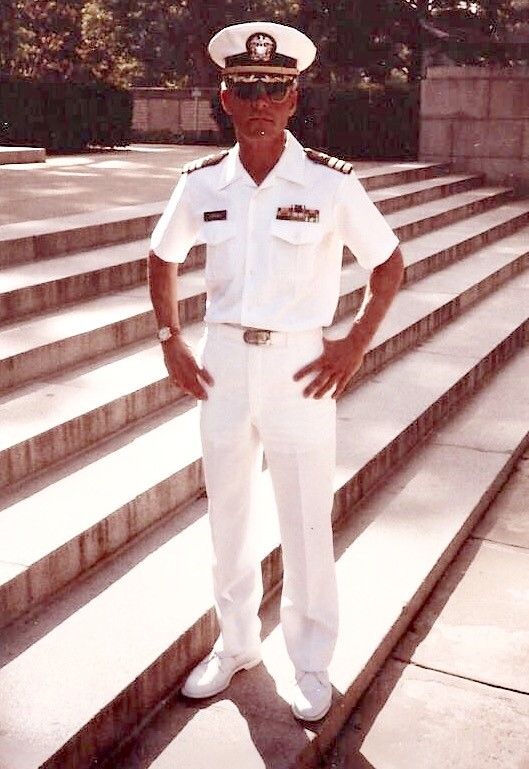Naval Reserve Commander Victor Tardino Jr.

Naval Reserve Commander (CDR) Victor Tardino Jr. served in the U.S. Navy for 20 years, splitting his time between active duty and the reserves. As a young man and the ongoing threat of the war in Vietnam, CDR Tardino decided to join the military to serve his country. CDR Tardino did not want to go into ground combat but preferred to be on a ship. He applied to many branches of service, but ultimately decided on the Navy because he was ready to begin his service as soon as he could. Like most parents at the time, CDR Tardino’s mother had concerns. However, she was supportive of her son’s decision and how sincere he was about his commitment to service. After talking to a friend of his in college, he learned that the best way for him to go into the military was by being commissioned as an officer. To become an officer in the military you are required to have a formal education and attend Officer Training School.
After completing Officer Training, CDR Tardino was stationed on a National Emergency Command Post Afloat (NECPA) ship. A NECPA ship is a large Naval vessel that would help evacuate the president and important political figures during a National Emergency such as a nuclear strike. NECPA ships had large saferooms designated for the president and his family.
CDR Tardino held the position of an Unrestricted Line Officer Lieutenant Junior Grade, which is equivalent to a 1st Lieutenant in the Army, and would later become a Qualified Officer of the Deck. As a Qualified Officer of the Deck, you are responsible for piloting the NECPA ship. CDR Tardino described the experience as much different than driving a powerboat. CDR Tardino explained to me that “You don’t just hit the throttle and it moves. You have to contact the engine room and explain how many revolutions you need per minute, what speed you want, and which engine they’re using.” It was all new to him at the time but later became second nature.
Having been attached to many ships, later on in his military career, CDR Tardino received a call from a commander in Washington DC who said, “Giving you a heads up; we’re sending you to Survival School and you’re going to be assigned in-country Vietnam.”
CDR Tardino was assigned as the Commanding Officer of a small Naval base on the South China Sea. He embarked on this duty as an individual officer. While on his way to the base, CDR Tardino recalls seeing soldiers armed with heavy weapons being loaded onto jeeps, something he wasn’t used to. At the time, the Marine Corps stationed by the Daning River were ordered to shoot “anything in the water that floated,” for fear of enemy explosives. As CDR Tardino was being sent to the base, the Marines started shooting. With no weapon, there was no way that he could defend himself. Fortunately, the Marines stopped firing. CDR Tardino described this experience as “frightening.” Once he arrived at the base, the previous Commanding Officer had to indoctrinate CDR Tardino and show him how the base operated. CDR Tardino would quickly learn that this base was much more dangerous than his previous experiences aboard ships. During his time at the base, CDR Tardino witnessed firsthand some of the tragedies that war can bring as well as more positive outcomes such as friendship, comradery, and feelings of hope.
After completing his 20 years of service, CDR Tardino and his wife moved out to Arizona for four years to be closer to where his wife was born and raised. CDR Tardino missed the change of seasons that occurred here in Connecticut and surrounding areas, and they decided to move back to Ridgefield where they have lived for 15 years. CDR Tardino enjoys that his three kids live close to where he and his wife live and being able to visit his grandchildren who also live locally. A 20-year career in the military allowed for certain benefits only accessible to Veterans such as medical care and a pension.
One final topic brought up in our meeting was ways that young people can support Veterans in their community. CDR Tardino explained that one good way to support Veterans is by “Having an appreciation for people who have gone out of their way to try and protect the country.” Some advice that CDR Tardino would give to people considering pursuing a career in the military is mainly to consider the branch of service that you are the most interested in, and which branch of service is the best for you.